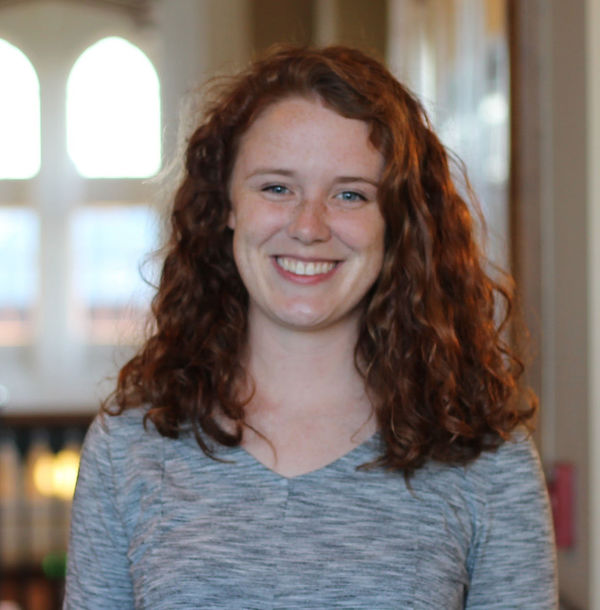Haley Barlow (ND Class of 2017)

My time at Notre Dame significantly shaped the person and the researcher I am today. While I was the typically overcommitted ND student (marching band, Uplift, a biology major with honors, an Italian minor that included studying abroad, friends, school, sleep??), one of my most transformative experiences was my time in the lab of Dr. David Hyde. After working in Dr. Hyde’s lab during Dr. Michelle Whaley’s intensive Cell Biology lab course, I begged Dr. Hyde to let me join his research group despite the high saturation of students my age in the lab. I was deeply fascinated by retinal regeneration research and I felt extremely driven to contribute to this field because of its clear and broad applications to the very pressing issue of human blindness.
After successfully breaking down Dr. Hyde’s willpower, I kicked off my time in the lab with a full-time summer funded by the Hiller Family Scholars program. That summer was full of challenges that, looking back, helped shape me into the scientist I am today. Research is hard, failure is the norm, and there are very few benchmarks against which you can measure yourself to see if what you are doing is enough. As I repeated countless procedures that didn’t work because of honest mistakes (like injecting drugs into the left eyes of all my zebrafish but then harvesting the right eyes by accident), I regularly felt like I was not going to be able to cut it as a researcher. It was with the support of my then-graduate student mentor, Dr. Jingling Li, that I realized my perceived shortcomings were actually par for the course. I will always remember feeling like I could fly when she told me at the end of the summer what a good job I had done and how proud she was of me.
After that, the science didn’t get any easier, but I grew in confidence in my techniques and in my scientific thinking. In lab meetings and in journal clubs, everyone in lab truly listened to my ideas and helped me realize that I was actually capable of contributing new and valuable ideas to scientific conversations. This was augmented by my experience in the Biology Honors Program, which left me confident in my writing abilities as well. By the time graduation rolled around, I was working independently in the lab and designing experiments to answer what I thought were the most important questions in my project.
Thanks to the firm foundation I built at Notre Dame, I am now in hot pursuit of my Ph.D. at the University of Texas Southwestern Medical Center in Dallas, TX. Specifically, I am part of the Molecular Biology Department and the Genetics, Development, & Disease graduate program. I have chosen to work with Dr. Ondine Cleaver, a brilliant developmental biologist and stellar mentor. I have lots of big ideas, but I am starting out by studying the basic mechanisms governing lumenogenesis in mouse endothelial cells. Blood vessels are nonfunctional cords without open lumens, and if we can understand how to inhibit or promote lumen formation then we can change the way we treat various diseases, including cancer and stroke.
My training in the Hyde lab has truly been invaluable to me in graduate school. I excelled in my courses, and once I joined a lab I was able to immediately start contributing intellectually. It has been pointed out that as a young graduate student, I am uniquely confident in speaking with professors, and I attribute that directly to my time with Dr. Hyde. Despite his intimidating reputation, I frequently forced myself to bust into Dr. Hyde’s office to ask him questions about my research and get his advice as I was applying to graduate school. This regular practice has helped me cultivate productive mentoring relationships with professors throughout UT Southwestern who will push me to be the best scientist I can be. The writing skills I developed at Notre Dame also enabled me to apply for three external grants in my first year in Dr. Cleaver’s lab.
If you are interested in a career in research, my two biggest recommendations are 1) to get started in research ASAP and 2) to talk to your mentors. Before I started in Dr. Hyde’s lab, I worked in two other labs that ended up being a poor fit for my interests. Because I got an early start in a lab the summer after my freshman year, I had plenty of time to explore my interests and find a lab that really got my engine going. Taking at least one summer to do full-time research is also critical – how will you know if you like research if you don’t really commit for a period of time? While I found full-time research challenging, it also taught me a lot about myself and my enjoyment of it is what ultimately persuaded me to pursue a career in research. Engaging with mentors is also critical for discerning your career path. While I know I often felt intimidated going into a professor’s office to ask what I frequently considered were pretty dumb questions, it is literally their job to help you. In particular, your research mentor benefits personally from your success. They will always invest time in helping you succeed.
Ultimately, Notre Dame and my association with the Center for Stem Cells through Dr. Hyde have been invaluable to my career in research. The well-rounded education I received has prepared me to take on any upcoming challenges in my training. I look forward to carrying the skills and values I absorbed at Notre Dame throughout my career as I aim to improve the lives of those suffering from disease through a career as a primary investigator in basic scientific research.